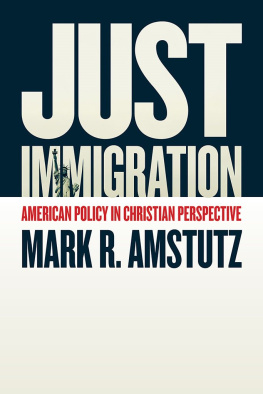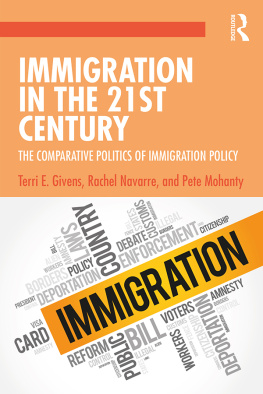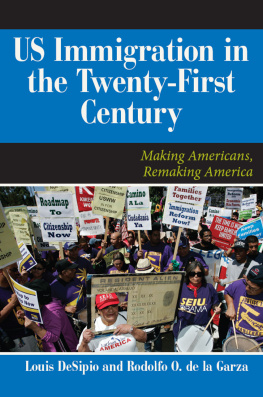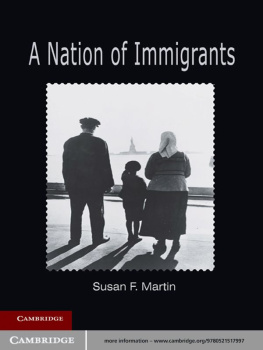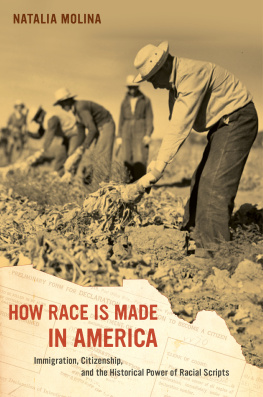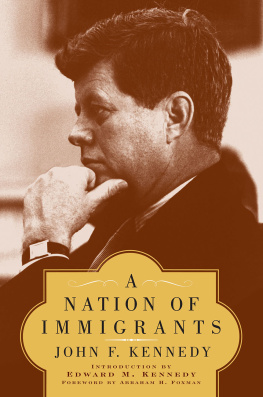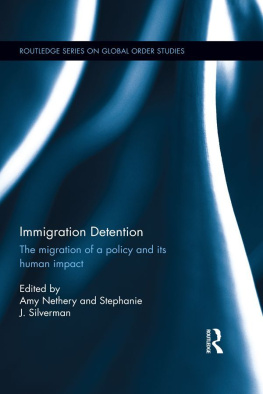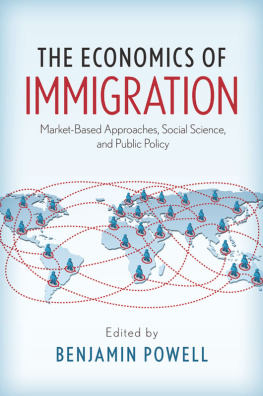IMMIGRATION NATION
IMMIGRATION NATION
RAIDS, DETENTIONS, AND DEPORTATIONS IN POST-9/11 AMERICA
TANYA GOLASH-BOZA
First published 2012 by Paradigm Publishers
Published 2016 by Routledge
2 Park Square, Milton Park, Abingdon, Oxon OX14 4RN
711 Third Avenue, New York, NY 10017, USA
Routledge is an imprint of the Taylor & Francis Group, an informa business
Copyright 2012, Taylor & Francis.
All rights reserved. No part of this book may be reprinted or reproduced or utilised in any form or by any electronic, mechanical, or other means, now known or hereafter invented, including photocopying and recording, or in any information storage or retrieval system, without permission in writing from the publishers.
Notice:
Product or corporate names may be trademarks or registered trademarks, and are used only for identification and explanation without intent to infringe.
Library of Congress Cataloging-in-Publication Data
Golash-Boza, Tanya Maria.
Immigration nation : raids, detentions, and deportations in post-9/11 America / Tanya Maria Golash-Boza.
p. cm.
Includes bibliographical references and index.
ISBN 978-1-59451-837-9 (hardback : alk. paper) ISBN 978-1-59451-838-6 (pbk. : alk. paper)
1. United StatesEmigration and immigrationGovernment policy. 2. Immigration enforcementUnited StatesHistory21st century. 3. ImmigrantsUnited States Social conditions21st century. 4. ImmigrantsCivil rightsUnited States. I. Title.
JV6483.G64 2011
325.73dc23 2011021055
ISBN 13: 978-1-59451-837-9 (hbk)
ISBN 13: 978-1-59451-838-6 (pbk)
Designed and Typeset by Straight Creek Bookmakers.
CONTENTS
INTRODUCTION
How Punitive Immigration Policies Negatively Affect Citizens, Families, and Communities
CHAPTER 1
Roots of Immigration to the United States
CHAPTER 2
The Department of Homeland Security and the Immigration Enforcement Regime of the Twenty-First Century
CHAPTER 3
Racism and the Consequences of U.S. Immigration Policy
CHAPTER 4
The Impossible Choice: Family versus Citizenship in U.S. Immigration Policies
CHAPTER 5
The Immigration Industrial Complex: Who Profits from Immigration Policies Destined to Fail?
CONCLUSION
Immigration Policy and Human Rights
To my mother, Deirdre Golash, herself an immigrant, and my father, Michael Golash, grandson of immigrants.
I began to conceptualize Immigration Nation in the spring of 2006the spring of immigrants in the United States. I was in my first year of a faculty position at the University of Kansas and was teaching courses on race and immigration. That spring, immigrants and immigrant-rights supporters marched en masse in cities and towns across the United States demanding immigration reform.
I found myself teaching my classes on immigration, yet knowing remarkably little about what the protests were about. I attended community meetings in Lawrence, Kansas, that criticized anti-immigrant legislative proposals and called for comprehensive immigration reform. I resolved that I needed to be more informed about immigration debates.
In May 2006, my department chair asked me to give a talk in honor of the retirement of one of our faculty members. I initially planned to deliver a talk from my research on Latinos racial identifications on the Census. However, I saw this as an opportunity to force myself to learn more about the immigrant rights movement in the United States and agreed to deliver a paper on immigration reform.
A portion of that paper was published in the online magazine Counterpunch, which led to two coauthored publications on immigration and human rights with sociologist Douglas Parker. With those publications, I was on my way to becoming an immigrant rights scholar. More importantly, I was developing a vision of how immigration reform could be conceptualized with human rights at its core.
In spring 2008, while on a post-doctoral fellowship at the University of Illinois at Chicago, I had the opportunity to begin to write this book. I was in Chicagoin the heart of the immigrant rights movementand I had plenty of material and inspiration. I began to volunteer at Latinos Progresando, a nonprofit organization that works for immigration reform, and I attended the meetings of local immigrant rights groups.
I lived in Little Village, a community with a high percentage of undocumented migrants. I participated in the marches of the spring of 2008 and felt the solidarity and determination of the Latino community in Chicago. The more I read about the immigration raids occurring around the country and the heartless deportations happening every day, the more inspired I became to finish my book. By the end of the summer of 2008, I had a working draft of this manuscript.
At that point, I began the process of revision and benefited immensely from the feedback of many colleagues and friends. I especially would like to thank Holly Goerdel, Yajaira Padilla, Jorge Perez, Jessica Vasquez, Amalia Pallares, Ruth Gomberg-Muoz, Nicholas de Genova, Brent Metz, Judith Blau, David Brunsma, Ian Golash, Joane Nagel, Dave Stovall, Bernard Headley, Victor Romero, Rekha Sharma-Crawford, Joanna Dreby, and Marta Caminero-Santangelo for their useful feedback on various portions of this manuscript. This manuscript has also benefited from the guidance of my editor, Jennifer Knerr, the two anonymous reviewers for Paradigm Publishers, and the two copy editors, Karen Gill and Kristy Johnson. I also must thank Kerry Ann Rockquemore, Angela Black, Eileen Diaz-McConnell, and other members of the National Center for Faculty Development and Diversity for allowing me to believe that writing this book was possible and for giving me a constant source of inspiration along the way.
Very special thanks also go to the tireless, dedicated staff at Latinos Progresando: Luis Gutierrez, Marcy Gonzalez, Juana Salazar, and Melissa Gonzalez, who have all helped tremendously with this project. The research for this book would not have been possible without generous funding from the Fulbright-Hays Faculty Research Abroad Award, the General Research Fund of the University of Kansas, and the College of Liberal Arts and Sciences at the University of Illinois at Chicago.
The human rights vision that is at the core of this manuscript is a vision I have learned from my long-standing mentor, Judith Blau. Judith is at the center of the human rights revolution in sociology. Her vision of how sociology can do more than simply diagnose social ills is the motivating force behind this text. From Judith and other members of the organization she founded, along with Alberto MoncadaSociologists without BordersI have learned that sociologists can work to shift the scholarly, political, and public discourse toward one that recognizes the fundamental dignity of all human beings. This is the project this book takes on.
W hile watching a YouTube video about a nine-month old infant, tears began to well up in my eyes. The baby had been taken to the hospital to be treated for dehydration, after being deprived of her mothers breast milk. The infants mother had left for work that morning and never returned. She was arrested by Immigration and Customs Enforcement (ICE) in an immigration raid in New Bedford, Massachusetts, and was in ICEs custody. As a result, the baby refused to take a bottle, had a high fever, and was crying inconsolably. As I listened to the narrator explain, over the persistent wail of this child, that her mother was put in jail for working without proper documentation, I became increasingly upset. Perhaps I was so troubled because I, too, am a mother who has nursed her children, and I could imagine the distress this mother felt, or perhaps it was because the story was simply heartbreaking. I scrolled down the screen to read comments left by viewers. Many experienced an entirely different reaction to the video than I did. For them, the video evoked not sympathy, but disgust, and they sharply expressed their thoughts by writing comments such as these:



